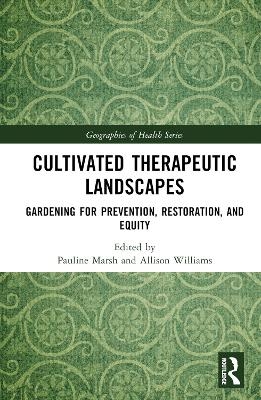
Cultivated Therapeutic Landscapes
Routledge (Verlag)
978-1-032-40992-4 (ISBN)
Therapeutic landscapes are relational, reciprocal, and evolving. In this book, leading scholars from across the globe demonstrate how therapeutic landscapes research and practice is expanded through and around the processes of cultivation. Deliberately interdisciplinary, the book explores how tending and caring for green spaces, collectively and individually, works to prevent and restore health and wellbeing, as well as impact upstream factors determining social justice and equity. A unique combination of academics, clinicians, and practitioners deliver theoretical and practical insights into wide-ranging health-enabling factors, based on new evidence and autoethnographic experiences in home gardens, school, and community gardens, clinical settings, public green spaces, and sites of conservation and wildness. This book pushes concepts of cultivation and horticulture into underexplored spatial, ontological, and wellbeing territories. Despite long-term practical interest, thera-peutic horticulture is only now establishing a strong theoretical and research foundation.
This book provides much-needed critical insights into the impact on the key drivers of health, wellbeing, and social equity, with a focus on practical skills for utilising horticulture or designing for particular health needs. It will be of interest to students, scholars, and practitioners in the areas of health geography; cultural geography; cultural studies; therapeutic horticulture; environmental studies; community development and planning; landscape architecture; social work; health studies; and health policy.
Pauline Marsh is a health geographer and senior lecturer at the University of Tasmania. Pauline was awarded a PhD in indigenous film theory; however, over the past decade her research has primarily been in therapeutic landscapes, specifically exploring how being in nature improves quality of life and health equities. She is particularly interested in the benefits of gardens and the outdoors for people with cognitive, emotional, and physical health challenges, as well as the impacts that gardeners and gardens have on the health and wellbeing of whole communities and the planet. She utilises methods of participatory action research, story-gathering and filmmaking and publishes in a range of academic journals. As a practitioner-academic, one of her greatest achievements is the co-founding of DIGnity Supported Community Gardening, a unique therapeutic horticulture model that operates in community gardens. Pauline is also a beekeeper and mother of two spectacular adults. She lives in a small beachside community at the bottom of the world. Allison Williams is a Professor at McMaster University, in Hamilton, Ontario, in Canada. She is a social and health geographer with research interests in carer-employees, quality of life, critical policy/programme evaluation and therapeutic landscapes. Her research focuses on improving workplace practices for supporting employees with adult care responsibilities. Allison has received various awards for her work, having had three five-year Research Chairs funded by the Canadian Institutes of Health Research. She currently holds a McMaster University Faculty of Science Research Chair and leads a Partnership Grant made up of more than 50 collaborators which mobilises carer-friendly workplaces. Allison has supervised more than 30 graduate trainees. Allison works with UN-Women across the world, specifically engaging in research on United Nations Sustainable Development Goal 5: Gender Equity, and Target 5-4: Value unpaid care and promote shared domestic responsibilities. In addition to co-editing the Routledge Geographies of Health Series, Allison has authored five books, 30 book chapters, and more than 180 peer-reviewed journal articles. Her most recent book is entitled Geography, health and sustainability: Gender matters globally (Routledge, 2021). Allison has been Principal Investigator of over 25 research projects and serves on a range of national and international adjudication committees. She is a mother of two beautiful children and cares for her 90-year-old uncle, together with her ageing parents, both of whom are in their 80s.
Introduction
Pauline Marsh and Allison Williams
Part I: Boots on: Scoping the cultivated therapeutic landscape
1. Tending more than gardens: Engaging residents in public landscapes to cultivate urban nature
Sara Barron, Kate Lee, Maddison Miller and Emily Rugel
2. Gardening for good in Ontario, Canada: A case study of Hamilton’s Victory Gardens
Allison Williams
3. Growing health in local food gardens: Case studies of community, school, and home gardens
Sumita Ghosh
4. The cultivated ‘healing garden’: Respite and support or lifestyle change?
Esther Veen and Karolina Doughty
5. Mental health outcomes associated with gardening: A scoping review
Selma Lunde Fjaestad, Jessica L Mackelprang, Takemi Sugiyama and Jonathan Kingsley
Part II: Companion planting: Cultivating human wellbeing
6. Critically exploring public realm greenspace as a therapeutic landscape and the role of Green Social Prescribing
Jessica Thompson, Michelle Howarth, Michael Hardman and Penny Cook
7. Creating a therapeutic garden for people with Huntington’s Disease and other neurological conditions
Josephine Spring
8. Green places in red spaces: Broadening understanding of therapeutic gardening within rural Australia
Amy Baker, Alejandra Aguilar and Ben Sellar
9. Health and wellbeing benefits of therapeutic gardens and gardening activities for older people living in residential aged care settings
Theresa L Scott
Part III: Dig Deep: expanding and enriching the cultivated therapeutic landscape
10. Environmental place-making by the ‘out of place’: Migrants building connections to new landscapes through structured conservation activities
Pauline Marsh, Suzanne Mallick, Dave Kendal and Renae Riviere
11. Eradicating malnutrition through small-scale, diverse and local food production
Bruce French and Anthea Maynard
12. Nurturing Soil-adarities: Growing multispecies justice in therapeutic landscapes
Bethaney Turner
13. Tending the wilds inside: Cultivating healing at the unruly edges of the garden
Alice McSherry and Robin Kearns
14. Conclusion
Horti-cultural geographies: Situating the garden as an assemblage of health and wellbeing
Ronan Foley
| Erscheinungsdatum | 22.08.2023 |
|---|---|
| Reihe/Serie | Geographies of Health Series |
| Zusatzinfo | 10 Tables, black and white; 10 Line drawings, black and white; 15 Halftones, black and white; 25 Illustrations, black and white |
| Verlagsort | London |
| Sprache | englisch |
| Maße | 156 x 234 mm |
| Gewicht | 480 g |
| Themenwelt | Sachbuch/Ratgeber ► Gesundheit / Leben / Psychologie |
| Studium ► 1. Studienabschnitt (Vorklinik) ► Med. Psychologie / Soziologie | |
| Studium ► Querschnittsbereiche ► Prävention / Gesundheitsförderung | |
| Naturwissenschaften ► Geowissenschaften ► Geografie / Kartografie | |
| Technik ► Umwelttechnik / Biotechnologie | |
| ISBN-10 | 1-032-40992-4 / 1032409924 |
| ISBN-13 | 978-1-032-40992-4 / 9781032409924 |
| Zustand | Neuware |
| Informationen gemäß Produktsicherheitsverordnung (GPSR) | |
| Haben Sie eine Frage zum Produkt? |
aus dem Bereich


